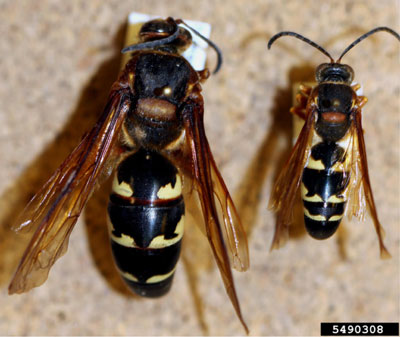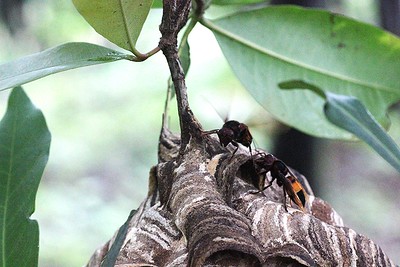Hornets are large, aggressive insects that can become a nuisance if they choose to nest around your property. While hornets are known for their painful stings and aggressive behavior, many homeowners wonder if these insects can also cause structural damage. Understanding what damage does hornet cause and how to manage a hornet infestation can help protect your home and property.



How Can Hornets Damage My Home?
Hornets themselves do not directly cause significant structural damage to homes, but their nesting habits can lead to some issues. Hornets create their nests from a papery substance made by chewing wood fibers mixed with their saliva. To build these nests, hornets may strip wood from trees, fences, or wooden structures around your home. Although this wood stripping is typically minimal, over time it can result in small, noticeable damage to wooden surfaces like fences, decks, or outdoor furniture. More importantly, how can hornets damage my home often relates to the location of their nests. Hornets prefer sheltered, hidden spots, and they may build nests in places such as attics, wall cavities, or under roof eaves. Nests inside walls or attics can lead to insulation damage, especially if the nest grows large. As hornets continue to expand their colony, the nest may also attract moisture, which can contribute to mold growth and water damage. If hornets build their nests in your home’s siding, walls, or attic, the nest can block ventilation systems or access to wiring. Additionally, if hornets gain entry through small holes or cracks, they may weaken parts of the structure, making your home more vulnerable to further infestations by other pests.The Risks of Hornet Infestations
Aside from potential structural damage, the primary risk of a hornet infestation is the threat they pose to your safety. Hornets are highly territorial and will defend their nest aggressively. If their nest is near common areas of your home, such as doorways, windows, or patios, it increases the risk of being stung. Hornet stings are painful and can cause serious allergic reactions in some individuals, which is a major concern for homeowners, especially if the nest is in a high-traffic area. In addition, hornets can cause damage to gardens and crops. Since they are predators, hornets often hunt other insects like bees. This can disrupt the local ecosystem and affect the pollination of plants in your garden.How to Prevent Hornets from Damaging Your Home
Preventing hornets from building nests around your home is key to avoiding the potential damage they can cause. Here are a few steps you can take to prevent hornets from nesting:- Seal Entry Points: Inspect your home’s exterior for any cracks or holes that hornets could use to gain access to wall cavities, attics, or other protected areas. Sealing these entry points with caulk or mesh can prevent hornets from entering your home.
- Remove Attractants: Hornets are attracted to food sources such as sugary foods, ripe fruit, and garbage. Keep outdoor trash cans tightly sealed and clean up any food or drink spills promptly to reduce the chances of attracting hornets to your home.
- Trim Vegetation: Hornets often build nests in trees, shrubs, and overgrown bushes. Regularly trimming vegetation around your home can help reduce potential nesting spots and make your yard less attractive to hornets.
- Install Fake Nests: Hornets are territorial and generally avoid building a nest near an existing one. Installing a fake hornet nest in key areas can deter new colonies from forming.
- Call a Professional: If you notice hornets building a nest on your property, it’s best to call a pest control professional. Do not try to remove a nest yourself, as hornets will aggressively defend their colony.

Myths and Facts About Hornet Damage
| Myth | Fact |
| Hornets can cause significant structural damage to homes. | While hornets can strip small amounts of wood, they typically do not cause major structural damage. |
| All hornet nests are visible and easy to find. | Hornets often build nests in hidden areas like attics, walls, or roof eaves, making them harder to detect. |
| Hornets only build nests outdoors. | Hornets may build nests inside homes, especially in attics or wall cavities. |
| Removing one hornet nest will stop all future infestations. | If your home is still attractive to hornets, they may return to build new nests. |
| Hornets only build nests in the summer. | Hornet activity peaks in summer, but nests can remain active into the fall, especially in warmer climates. |




